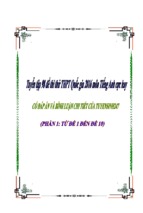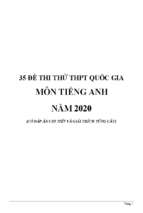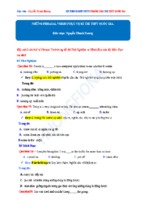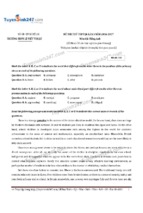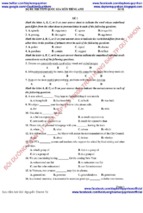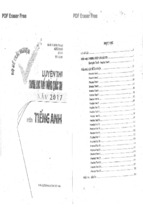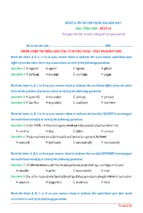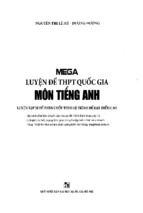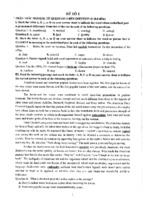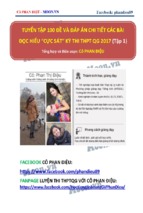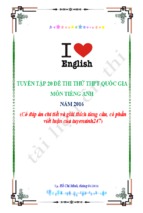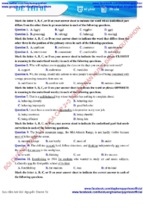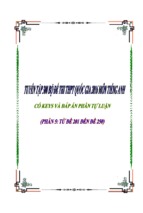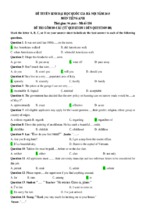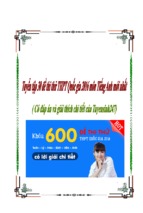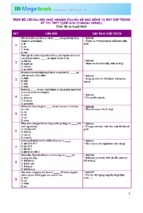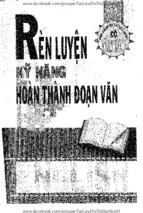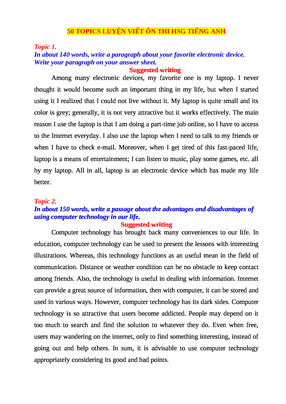TUYỂN TẬP ĐỀ THI – CÂU HỎI ÔN THI MÔN TIẾNG ANH
TUYỂN TẬP ĐỀ
THI – CÂU HỎI ÔN
THI MÔN TIẾNG
ANH
NĂM 2018
Chuyên đề bài tập các từ hay nhầm lẫn trong Tiếng Anh
CHUYÊN ĐỀ BÀI TẬP CÁC TỪ HAY NHẦM LẪN
TIẾNG ANH
Exercise 1 Choose the correct word for each sentence.
1. The train has been (delayed / postponed) by ten minutes.
2. Did you (notice / remark) what he was wearing?
3. Please (bring / take) that book over there.
4. She loves reading about the (last / latest) fashion.
5. They were (delighted / delightful) that she had won.
6. He (laid / lay) down on the sand and went to sleep.
7. The bus leaves from the (station / stop) nearest the office.
8. He put up a big (note / notice) advertising the concert.
9. We (wait for / expect) him to arrive tomorrow morning.
10. 1066 is one of the most (historical / historic) moments in British history.
11. They (robbed / stole) him of all his money.
12. My teacher (complemented / complimented) me on my essay. She said it was the best thing she
had read
for a long time.
13. I find it impossible to sleep because of the (continuous / continual) noise from the party in the
flat above.
14. What I thought was a genuine Van Gogh turned out to be a forgery. As a result, the painting is
now
quite (worthless / invaluable).
15. It’s too hot. Let’s go and sit in the (shadow / shade) for a while.
Exercise 2 Choose the correct word for each sentence.
1. I bought my (stationary / stationery) from this shop.
2. Sulin is a member of the student (counsel / council).
3. Justin is an (eminent / imminent) figure in the advertising industry.
4. Your handwriting is so (illegible / eligible). I cannot read what you have written.
5. These images are designed to (illicit / elicit) sympathy from the viewers of the charity show.
6. In this country, temples are considered very (sacred / scared) places.
Nguyễn Tiến Dũng-Ad fanpage: Hội học sinh, sinh viên chuyên anh4
|5
Chuyên đề bài tập các từ hay nhầm lẫn trong Tiếng Anh
7. The government has given their (assent/ ascent) to build a casino on that island.
8. Sorry, I have no (access / assess) to this room. You may wish to check with the security
personnel.
9. Take this painkiller. It can (alleviate / elevate) your pain.
10. Everything has been ironed (except/ accept) this pair of pants.
11. The residents of Nias have been very much (affected/ effected) by the recent earthquake.
12. Can you please (advice / advise) as to what I should do regarding this naughty student?
13. The beautiful bride walked down the (isle/ aisle), accompanied by her father.
14. I recorded what happened today in my (diary / dairy).
15. The manager (misused / abused) the funds intended for the dental care of her workers.
Exercise 3 Choose the correct word for each sentence.
1. The outbacks of Australia are mostly (deserts/ desserts).
2. The burden proved too much for her to (bare / bear) so she collapsed.
3. This cloth is very (course / coarse). It would not be suitable for making pajamas.
4. You (ensure / insure) that everything goes on smoothly, we have to run through the procedure a
few
times.
5. The birds (migrated / emigrated) to the warm south to escape the harsh winter.
6. The (allusion / illusion) of a body being cut into two inside the box is but a trick.
7. I (ransacked / rummaged) through my drawer to look for the missing key.
8. This oven special digital features, unlike the common (contemporary / conventional) ones.
9. She was (credited / rewarded) with a gold pen for her contribution to the project.
10. The (principal / principle) of this school has retired.
11. Susie (lies / lays) her dress on the bed and wonders if she should wear it to the party.
12. Can you please (take / fetch) her to the bus stop?
13. The rising sun (emerged / immerged) from the horizon.
14. Dr Wee is a (human / humane) physician. He treats the poor for free.
15. Where exactly do you (live / stay)?
Exercise 4 Choose the correct word for each sentence.
1. When the (brake / break) of a car is engaged, it will not move.
2. The store has a (wide / big) range of products.
3. Mrs Husher, an (affirm / infirm) elderly, is a resident at the Home for the Elderly.
4. I will let you know my decision (later / latter).
5. Why don’t you (accede / exceed) to my request for once?
6. The dream was so (clear/ vivid) it seemed real.
7. This species of tropical insects has (adapted / adopted) well to winter climates.
8. People who (violate/ break) the law should be punished.
9. She was (credible / credulous) enough to believe his lies.
10. The perfume (diffused / defused) through the room and left a pleasant fragrance.
11. The only (criteria / criterion) for entering this cafe is that you must be formally dressed.
Nguyễn Tiến Dũng-Ad fanpage: Hội học sinh, sinh viên chuyên anh4
|5
Chuyên đề bài tập các từ hay nhầm lẫn trong Tiếng Anh
12. An effective couple always (complements / compliments) each another in strengths and
weaknesses.
13. The (current / currant) trend amongst teenagers today is to own a handphone.
14. When you leave this place, please remember to (take / bring) this souvenir with you.
15. The police arrived at the accident scene and (disbursed / dispersed) the crowd
Exercise 5 Choose the correct word for each sentence.
1. The motorist admitted to (breaking / passing) the speed limit.
2. Julie is (envious / jealous) of the doll that Jane has. She has never owned one as exquisite before.
3. The gangsters decided to settle their differences in a (dual / duel).
4. We do not see eye to eye regarding this matter because our opinions (differ / vary).
5. When she passed her examination with flying colors, she shouted joyous (exhilaration /
exaltation).
6. Please pass me that (hangar / hanger) so that I can drape my dress.
7. We need to (instil / install) good values in our young ones.
8. From the evidence, the detective (inferred / implied) that the killing took place in the kitchen.
9. You can check the records if you wish to certiíy your employee’s (marital / martial) status.
10. All the subjects in the school curriculum are taught in the English (medium / median).
11. So sorry, I must have (overlooked / overseen) this area of work.
12. Tom climbed to the top of the wall to take a (peep / peek) at what his neighbors were doing.
13. This tuition centre is constantly expanding the (perimeters / parameters) of its curriculum.
14. Mali is (persecuted / prosecuted) by her own parents for choosing Christianity over their family
religion.
15. This is a (personal / personnel) matter, please do not interfere.
Exercise 6 Choose the correct word for each sentence.
1. Next year we’re going on a cheap (package / charter) holiday to Portugal.
2. That colour doesn’t (fit / suit) you.
3. It was a tough decision to (make/ do).
4. The coach trip to Bruges was fully (booked / reserved).
5. Don’t you know that never liked egg (yolk / yoke)?
6. This (troop / troupe) of períòrmers are from London and they are good in their craft.
7. We cannot understand Sandra at times because she speaks English with a Japanese (accent /
assent).
8. Are you meeting your (perspective / prospective) husband today?
9. A sting from this insect can be (fatal / fateful).
10. Her (empathies / sympathies) lie with her íamily and she is bound to take sides with them.
11. To start a business, you would need (Capital / capitol).
12. In (advẹrse / averse) circumstances, we must leam to be flexible.
13. His explanation is so confusing and (ambiguous / ambivalent) that I have no idea what he is
talking
about.
Nguyễn Tiến Dũng-Ad fanpage: Hội học sinh, sinh viên chuyên anh4
|5
Chuyên đề bài tập các từ hay nhầm lẫn trong Tiếng Anh
14. She bought the hand-carved elephant as a (souvenir / memory) of the safari.
15. Can you help me to pass this (message / massage) to her?
Exercise 7 Choose the correct word for each sentence.
1. The footballer was suspended for (foul / fowl) play.
2. There will be an (aural / oral) examination next week. The teacher will give you some tips to
sharpen
your conversation skills.
3. If there is no (cohesion / adhesion) in the group, it is difficult to forge unity.
4. My wallet was (stolen / robbed) right under my nose, yet I was not even aware of it.
5. Kevin takes on a holiday job to help his family out financially. He is a very (sensible / sensitive)
boy.
6. This piece of information is extremely (valuable / invaluable). It has helped me a lot.
7. It is already (past / passed) two o’clock and she is still not here yet.
8. Do not walk through the dark (alley / ally) at night alone as it can be dangerous.
9. The counselor has been asked to (mediate / meditate) a parent-teacher dispute.
10. The dead bird was (laying / lying) on the floor for the longest time but no one took notice of it.
11. Can you please help me to (sew / sow) this button onto the skirt?
12. The little girl (wandered / wondered) off without her mother’s knowledge.
13. Since Sally did not mention that she is coming for this party, Jane (assumes / presumes) that she
is not
coming.
14. Joan has gone (aboard / abroad) the ship.
15. It is not your (fault / mistake) that she fell down. It was purely an accident.
ANSWER KEYS
Exercise 1
1. delayed 2. notice 3. bring 4. latest
5. delighted 6. lay 7. stop 8. notice
9. expect 10. historic 11. robbed 12. complimented
13. continuous 14. worthless 15. shade
Exercise 2
1. stationery 2. council 3. eminent 4. illegible
5. elicit 6. sacred 7. assent 8. access
9. alleviate 10. except 11. affected 12. advise
13. aisle 14. diary 15. misused
Exercise 3
1. deserts 2. bear 3. coarse 4. ensure
5. migrated 6. illusion 7. rummaged 8. conventional
9. rewarded 10. principal 11. lays 12. take
13. emerged 14. humane 15. live
Exercise 4
Nguyễn Tiến Dũng-Ad fanpage: Hội học sinh, sinh viên chuyên anh4
|5
Chuyên đề bài tập các từ hay nhầm lẫn trong Tiếng Anh
1. brake 2. wide 3. infirm 4. later
5. accede 6. vivid 7. adapted 8. break
9. credulous 10. diffused 11. criterion 12. complements
13. current 14. take 15. dispersed
Exercise 5
1. breaking 2. envious 3. duel 4. differ
5. exhilaration 6. hanger 7. instill 8. inferred
9. marital 10. medium 11. overlooked 12. peek
13. parameters 14. persecuted 15. personal
Exercise 6
1. package 2. suit 3. make 4. booked
5. yolk 6. troupe 7. accent 8. prospective
9. fatal 10. sympathies 11. capital 12. adverse
13. ambiguous 14. souvenir 15. message
Exercise 7
1. foul 2. oral 3. cohesion 4. stolen
5. sensible 6. valuable 7. past 8. alley
9. mediate 10. lying 11. sew 12. wandered
13. assumes 14. aboard 15. fault
Nguyễn Tiến Dũng-Ad fanpage: Hội học sinh, sinh viên chuyên anh4
|5
CHUYÊN ĐỀ CÂU SO SÁNH
CHUYÊN ĐỀ: CÂU SO SÁNH
I. The Comparative (So sánh hơn kém)
1. Cách dùng: để so sánh hai người hoặc hai vật hơn kém nhau về cái gì đó.
2. Tính từ/trạng từ ngắn và tính từ/trạng từ dài:
Short Adjectives/Adverbs: Tính từ ngắn vần là tính từ có một vần (tall, hot, old,
young…)
Lưu ý: Tuy nhiên, tính từ có 2 vần nhưng tận cùng bằng “y” thì ta coi đó là tính từ
ngắn (happy, noisy, lazy, easy…)
Tính từ có 2 vần nhưng tận cùng là ow, er, et, le thì ta coi đó là tính từ ngắn
(narrow, clever, quiet, noble…)
Long Adjectives/Adverbs : Tính từ dài là tính từ có 2 vần trở lên (famous,
expensive, beautiful, diligent…)
Lưu ý: Tính từ tận cùng là ed, ing,ful,ish là những tính từ dài (bored,interesting,
selfish…)
3. Công thức:
-
Với tính từ ngắn, chúng ta dùng công thức: adj/adv + er + than.
Ví dụ 1: I am younger than Nina. ( Tôi thì trẻ hơn Nina.)
Ví dụ 2: I ran faster than my sister. ( Tôi chạy nhanh hơn chị của mình.)
-
Với tính từ dài, chúng ta dùng công thức: more + adj/adv + than.
Ví dụ 1: I am more beautiful than Nina.( Tôi đẹp hơn Nina)
Ví dụ 2: I drive more carefully than Nina. (Tôi lái xe cẩn thận hơn Nina)
Tài liệu sưu tầm, tổng hợp Page 1|6
CHUYÊN ĐỀ CÂU SO SÁNH
4. Trường hợp đặc biệt và chú ý:
a. Những tính từ tận cùng “y” vẫn được xem là tính từ ngắn, ta biến “y” thành “i”
sau đó thêm “er”. (Happy -> Happier; Pretty -> Prettier; Dry -> Drier; Lonely ->
Lonelier).
Ví dụ: She is prettier than her sister. (cô ấy đẹp hơn chị cô ấy.)
b. Có những tính từ/trạng từ vừa được xem là tính từ/trạng từ ngắn, vừa được xem là
tính từ/trạng từ dài. Ta vẫn làm theo 2 cách:
Ví dụ: She is friendlier than he. (Cô ấy thân thiện hơn hắn ta.)
(hoặc) She is more friendly than he.
c. Đối với tính từ ngắn chỉ có một nguyên âm nằm giữa hai phụ âm tận cùng, ta phải
gấp đôi phụ âm đó khi dùng cấu trúc so sánh hơn kém.
Ví dụ: She is bigger than he. (Cô bé ấy to con hơn thằng nhóc.)
d. Sau “than” phải là một đại từ nhân xưng chủ ngữ, không được là một đại từ tân
ngữ.
Ví dụ: She is smarter than he (correct).
She is smarter than him (incorrect).
e. Khi so sánh một người hoặc vật với tất cả những người hoặc vật khác (anybody,
anything…), ta phải thêm “else”đằng sau (anybody, anything…)
Ví dụ: This book is newer than anything else on the rack. (Quyển sách này mới
hơn các quyển khác trên giá).
f. Có thể thêm much/far vào cấu trúc so sánh hơn kém để nhấn mạnh việc so sánh.
Công thức:
Tài liệu sưu tầm, tổng hợp Page 2|6
CHUYÊN ĐỀ CÂU SO SÁNH
S + V + much/far + Short Adjective/Adverb + er + than + N/Pronoun
S + V + much/far + more +Long Adjective/Adverb + than + N/Pronoun
Ví dụ:
A watermelon is much sweeter than a lemon. (Dưa hấu ngọt hơn chanh nhiều.)
This year’s fireworks show is much more impressive than last year’s.
(Hội bắn pháo hoa năm
nay cực kì ấn tượng hơn năm ngoái.)
g. Có thể so sánh hai danh từ với nhau nhưng phải cẩn thận phân biệt xem danh từ
đó đếm được hay không để dùng định ngữ đứng trước danh từ cho phù hợp. Công
thức:
S + V + more/fewer/less + noun + than + N/pronoun
Fewer/less là hai từ trái nghĩa với more, ta dùng Fewer + countable nouns (danh
từ đếm được), Less + Uncountable nouns (danh từ không đếm được), còn more +
countable/uncountable noun (more dùng được cả hai trường hợp danh từ đếm
được và không đếm được, vì nó là hình thức so sánh hơn củamuch/many.)
Ví dụ:
February has fewer days than March. (Tháng 2 ít ngày hơn tháng 3.)
Their jobs allow them less freedom than ours does. (Công việc của họ ít tự do hơn chúng
tôi.)
I earn more money than he. (Tôi kiếm nhiều tiền hơn hắn ta.)
I have more books than he. (Tôi có nhiều sách hơn hắn ta.)
h.
Ta có thể loại bỏ chủ ngữ sau “as” của so sánh bằng và “than” của so sánh hơn
nếu chủ ngữ đó với chủ ngữ đứng đầu câu là một, đặc biệt khi động từ sau “than”
và “as” ở dạng bị động và lúc này “as” và “than” còn có chức năng như là đại từ
quan hệ thay thế.
Ví dụ :
Tài liệu sưu tầm, tổng hợp Page 3|6
CHUYÊN ĐỀ CÂU SO SÁNH
Their marriage was as stormy as had been expected. (correct) (Hôn nhân của họ đầy sóng
gió như đã được mong đợi.)
Their marriage was as stormy as it had been expected. (incorrect)
He worries more than was good for him. (correct)
He worries more than it/what was good for him. (incorrect)
Ta cũng có thể loại bỏ tân ngữ sau các động từ ở hai mệnh đề chứa “as” và
“than”.
Ví dụ:
Don’t miss your chance to get higher grades as I did last year. (correct).
Don’t miss your chance to get higher grades as I did it last year. (incorrect).
They gave more than I had expected. (correct).
They gave more than I had expected it. (incorrect).
II. Equal Comparison (So sánh bằng)
1.
Cách dùng:
Dùng để so sánh 2 người hoặc 2 vật bằng nhau về cái gì đó.
2.
Công thức: S + V + as + adj/adv + as + N/pronoun
Ví dụ:
My house is as big as yours. (Nhà tôi to bằng nhà bạn.)
She sings as well as my friend. (Cô ấy hát hay như bạn tôi.)
3.
Chú ý:
Tài liệu sưu tầm, tổng hợp Page 4|6
CHUYÊN ĐỀ CÂU SO SÁNH
a. Sau “as…as” phải là một đại từ nhân xưng chủ ngữ (I, he, she, they, we, you), không
được là đại từ tân ngữ (me, him, her, them, us.) (Lỗi này nhiều người vẫn thường mắc
phải.)
She is as intelligent as he. (correct) (Nó thông minh y chang chị nó.)
She is as intelligent as him. (incorrect)
b. Nếu so sánh dạng phủ định thì có thể thay “as…as” thành “so…as”.
My close friend doesn’t study as hard as I. (Bạn thân tôi không học giỏi bằng tôi.)
My close friend doesn’t study so hard as I.
c. Ta có thể biến đổi cấu trúc “as…as” thành cấu trúc “the same…as” mà nghĩa của câu vẫn
không thay đổi bằng cách chuyển tính từ nằm giữa “as…as” thành danh từ nằm
giữa “the same…as.”
S + V + the same + N +as + N/Pronoun
My bag is not as heavy as hers.(Cặp tôi nhẹ hơn cặp cô ấy.)
My bag is not the same weight as hers.
Để biết cách chuyển tính từ thành danh từ tương đương, ta ghi nhớ bảng sau:
Adjectives
Nouns
Heavy, light
Weight
Wide, narrow
Width
Deep, shallow
Depth
Long, short
Length
Big, small
Size
d. Chú ý: Cấu trúc “the same…as” có nghĩa trái ngược với “different from” = “different
than” nhưng “different than” cũng thỉnh thoảng được dùng trong văn phong Mỹ (đặc biệt
là báo chí Mỹ)
Tài liệu sưu tầm, tổng hợp Page 5|6
CHUYÊN ĐỀ CÂU SO SÁNH
Mitt Romney’s points of view are different than Obama’s. (hiếm gặp)
Mitt Romney’s points of view are different from Obama’s. (thường gặp)
e. Có thể so sánh hai danh từ với nhau nhưng phải cẩn thận phân biệt xem danh từ đó đếm
được hay không để dùng định ngữ đứng trước danh từ cho phù hợp.
S + V + as + many/much/little/few + noun + as + N/pronoun
(many/few + countable nouns; much/little + Uncountable nouns.)
He earns as much money as his father. (Nó kiếm tiền nhiều bằng cha nó.)
I have as few classes as she. (Tôi và nhỏ đó chẳng lấy lớp nào cả.)
I have as little pink as she. (Bút của tôi và nhỏ đó không có mực.)
My friends bring as many books as I. (Bạn tôi mang nhiều sách đi học giống tôi.)
Tài liệu sưu tầm, tổng hợp Page 6|6
REPORTED SPEECH/ INDIRECT SPEECH
I.
GRAMMAR .............................................................................................................................................. 2
1. WHAT IS REPORTED SPEECH? ................................................................................................................... 2
DIFFERENT TYPES OF SENTENCES ................................................................................................................. 2
2. REPORTING STATEMENTS ........................................................................................................................ 2
a. Pronouns ............................................................................................................................................. 2
b. Tenses .................................................................................................................................................. 2
c. Place, demonstratives and time expressions ....................................................................................... 3
3. REPORTING QUESTIONS ........................................................................................................................... 3
4. REPORTING REQUESTS / COMMANDS ........................................................................................................ 4
5. CONDITIONAL SENTENCES ....................................................................................................................... 4
a. Zero conditional .................................................................................................................................. 4
b. First conditional .................................................................................................................................. 4
c. Second conditional .............................................................................................................................. 4
d. Third conditional ................................................................................................................................. 4
6. OTHER TRANSFORMATIONS...................................................................................................................... 5
II. PRACTISE EXERCISE........................................................................................................................... 5
a.
b.
Rewrite into reported speech: ............................................................................................................. 5
Multiple choice .................................................................................................................................... 7
III. ANSWER KEYS ..................................................................................................................................... 13
a.
b.
Page 1
Rewrite into reported speech............................................................................................................. 13
Multiple choice .................................................................................................................................. 15
Nguyễn Thị Hoàng Yến
I. GRAMMAR
1. What is reported speech?
Reported speech is when you tell somebody else what you or a person said before.
Distinction must be made between direct speech and reported speech.
Direct speech
Reported speech
She says: "I like tuna fish."
She says that she likes tuna fish.
She said: "I'm visiting Paris next weekend" She said that she was visiting Paris the following weekend.
Different types of sentences
When you use reported speech, you either report:
statements
questions
requests / commands
conditional sentences
other types
2. Reporting Statements
When transforming statements, check whether you have to change:
pronouns
tense
place and time expression
a. Pronouns
In reported speech, you often have to change the pronoun depending on who says what.
Ex:
She says, “My dad likes roast chicken.” => She says that her dad likes roast chicken.
b. Tenses
If the sentence starts in the present, there is no backshift of tenses in reported speech.
If the sentence starts in the past, there is often backshift of tenses in reported speech.
Direct speech
Reported speech
(no backshift) “I write poems.” He says that he writes poems.
“I write poems.” He said that he wrote poems.
(backshift)
* No backshift
Do not change the tense if the introductory clause is in a present tense (e. g. He says). Note, however, that
you might have to change the form of the present tense verb (3rd person singular).
Ex:
He says, “I write poems.” – He says that he writes English.
* Backshift
You must change the tense if the introductory clause is in a past tense (e. g. He said).
Ex:
He said, “I am happy.” – He said that he was happy.
Examples of the main changes in tense:
Direct Speech
Simple Present
He said: "I am happy".
Present Progressive
He said: "I'm looking for my keys".
Simple Past
He said: "I visited New York last year".
Page 2
Reported Speech
Simple Past
He said that he was happy.
Past Progressive
He said that he was looking for his keys.
Past Perfect Simple
He said that he had visited New York the previous year.
Nguyễn Thị Hoàng Yến
Present Perfect
He said: "I've lived here for a long time".
Past Perfect
He said: "They had finished the work when I
arrived".
Past Progressive
He said: "I was playing football when the
accident occurred".
Present Perfect Progressive
He said: "I’ve been playing football for two hours."
Past Perfect Progressive
He said: "I had been reading a newspaper when the
light went off".
Past Perfect
He said that he had lived there for a long time.
Past Perfect
He said that they had finished the work when he had
arrived.
Past Perfect Progressive
He said that he had been playing football when the
accident had occurred.
Past Perfect Progressive
He said that he had been playing football for two hours.
Past Perfect Progressive
He said that he had been reading a newspaper when the
light had gone off.
The modal verbs could, should, would, might, needn't, ought to, and used to do not normally change.
Ex:
He said, "She might be right." – He said that she might be right.
Other modal verbs may change:
Modal
can
may
must
will
shall
Direct speech
"I can do it."
"May I go out?"
"She must apply for the job."
"They will call you."
“Today we shall eat out.”
Reported speech
He said he could do it.
He wanted to know if he might go out.
He said that she had to apply for the job.
He told her that they would call her.
He said that that day they should eat out.
c. Place, demonstratives and time expressions
Place, demonstratives and time expressions change if the context of the reported statement (i.e. the location
and/or the period of time) is different from that of the direct speech.
In the following table, you will find the different changes of place; demonstratives and time expressions.
Direct speech
today
now
yesterday
… days ago
last week
next year
tomorrow
here
this
these
Reported speech
Time Expressions
that day
then
the day before
… days before
the week before
the following year
the next day / the following day
Place
there
Demonstratives
that
those
3. Reporting Questions
When transforming questions, check whether you have to change:
pronouns
place and time expressions
tenses (backshift)
Also note that you have to:
transform the question into an indirect question
use the question word (where, when, what, how) or if / whether
Page 3
Nguyễn Thị Hoàng Yến
WH-questions
Yes/No questions
Direct speech
"Why" don’t you speak English?”
“Do you speak English?”
Reported speech
He asked me why I didn’t speak English.
He asked me whether / if I spoke English.
4. Reporting requests / commands
When transforming requests and commands, check whether you have to change:
pronouns
place and time expressions
Direct speech
Reported speech
He told Nancy to do the exercise.
“Nancy, do the exercise.“
"Nancy, give me your pen, please." He asked Nancy to give him her pen.
Tenses are not relevant for requests – simply use to / not to + verb (infinitive without "to")
Ex:
She said, “Sit down." => She asked me to sit down.
She said, "Don't be lazy." => She asked me not to be lazy.
For affirmative use to + infinitive (without to)
For negative requests, use not to + infinitive (without to).
5. Conditional sentences
a. Zero conditional
When we report zero conditionals, the following tense changes may occur:
Anne: If John is cursing, it means that he is very angry.
=> Anne said that if John is cursing, it means that he is very angry. (It is still/always true)
=> Anne said that if John was cursing, it meant that he was very angry. (Referring to a past habit)
b. First conditional
When we report first conditionals, the following changes may occur:
Mark: If we leave now, we can catch the train.
=> Mark said that if we leave now, we can catch the train. (Reported simultaneously; we can still catch the
train)
=> Mark said that if we left, we could catch the train. (The reported words are out-of-date; the train has
already left)
c. Second conditional
When we report second conditionals, the following changes may occur:
Future time
Catherine: If I lost my job, I would be in serious trouble. (Referring to a possible future situation)
=> Catherine said that if she lost her job, she would be in serious trouble. (The reported words are true; she
might still lose her job)
=> Catherine said that if she had lost her job, she would have been in serious trouble. (The reported words
are out-of-date; it's not possible that she will lose her job)
Present time
Paul: If I knew the answer, I'd tell you. (Referring to an unreal present situation)
=> Paul said that if he knew the answer, he'd tell us.
d. Third conditional
When we report third conditionals, there are no changes in the verb forms:
Page 4
Nguyễn Thị Hoàng Yến
Tom: If we had booked our flight earlier, it would have been cheaper. (Referring to an unreal past situation)
=> Tom remarked that if they had booked their flight earlier, it would have been cheaper.
6. Other transformations
Expressions of advice with must, should and ought are usually reported using advise / urge.
Ex:
“You must read this book.” => He advised / urged me to read that book.
The expression let’s is usually reported using suggest. In this case, there are two possibilities for
reported speech: gerund or statement with should.
Ex:
“Let’s go to the cinema.”
1. He suggested going to the cinema.
2. He suggested that we should go to the cinema.
Unreal tenses after wish / if only, would rather / would sooner, it's (high) time and as if / as though do
not change in indirect speech.
Ex:
- Susan: “I wish I lived in the mountains.”
=> Susan said she wished she lived in the mountains.
- Charles: “If only we hadn't missed the train.”
=> Charles wished they hadn't missed the train.
- Carol: “I'd rather go by bike than walk.”
=> Carol said that she would rather go by bike than walk.
- Mr. Wilkins: “I would rather you didn't smoke in here.”
=> Mr. Wilkins said he would rather I didn't smoke in his office.
- Newspaper article: “It's high time the government did something about this problem.”
=> The article said that it was high time the government did something about the problem.
- Jane: “He looks as if he knew the answer.”
=> Jane said that he looked as if he knew the answer.
II. PRACTISE EXERCISE
a. Rewrite into reported speech:
1. The spokesman said: “I can’t understand why billiards has been prohibited.”
2. Gihan exclaimed: “We have had too many prohibitions.”
3. The young lady said: “I did not make such a mistake.”
4. She said: “We’ll go and get some food.”
5. Winston Churchill said: “I wake up at six every day”
6. A company representative said: “This probably won’t happen.”
7. A farmer said: “If the situation goes on like this, we will lose the consumers” confidence forever”.
8. He added: “We need someone who will realize that celibacy has to be a personal choice”.
9. She said: “I think the amount of immigrants right now is OK, but I don’t think we need any more”.
10. He said: “In Japan paper-folding was valued for its decorative function”.
11. “If I don’t win this game, I will retire, ” Kasparov said.
12. The police said: “Youssef planned the World Trade Centre bombing”.
13. She said: “As a woman, my life will change with the new millennium”.
14. “I watched a documentary about dolphins on TV yesterday, ” said John.
15. “I’m living the adventure of my life, ” Banderas said.
16. Al Gore said: “As a teenager, one of the books that I read was Silent Spring.”
17. “I was taught information technology in this course, ” she said.
18. My aunt said: “Single men should drive slowly if they want to live longer.”
19. He said: “We are here today to reach consensus”
20. Last week Julia said: “We will meet our new instructor tomorrow”
Page 5
Nguyễn Thị Hoàng Yến
21. He said to one of them: “Let me see the streets once more before I die. I’ll be back in five minutes.”
22. “Please, don’t say anything to him”, he said.
23. “Don’t talk to me like that, ” said his mother.
24. She said: “Don’t smoke if you want to save money.”
25. “Buy me the paper if you’re going out”, Alice asked her brother.
26. He asked: “Do you often play rugby?”
27. The doctor asked: “Do you ever feel this pain in your stomach before meals?”
28. Michael asked her: “Where did you find these trainers?
29. Michael wondered: “Why do I do this every day?”
30. “What time did the film start?” she asked.
31. Her parents asked her: “Why do you want to become a bullfighter?”
32. They asked her mother: “Does he often come home late from school?”
33. The judge asked Karl: “How long have you known the accused?”
34. “What do you want?” she asked him.
35. “Are you coming with us?” he asked me.
36. He asked, “When do you intend to make the payment?”
37. “Do you come from China?” said the prince to the girl.
38. The poor man exclaimed, “Will none of you help me?”
39. “Which way should I go?” asked the little girl.
40. Aladdin said to the magician, “What have I done to deserve so severe a punishment?”
41. “Don’t you know the way home?” I said to her.
42. “Do you write a good hand?” the teacher said to the student.
43. “Have you anything to say on behalf of the accused?” said the judge finally.
44. “Have you anything to tell me, little bird?” asked Ulysses.
45. “Who are you, sir, and what do you want?” they asked.
46. The king was impressed with the magician and asked, “What can I do for you?”
47. She asked, “What is it that makes you stronger and braver than other men?”
48. “Can you solve this problem?” he asked me.
49. Jack: "I'll lend you my grammar book if you think it will help.
50. The doctor: "I'll send you the results as soon as they arrive."
51. She said “I´ve found my keys!”
52. They asked me “Did you see Tom at the cinema last night?”
53. He asked me “Do you know where the post office is?”
54. “Her parents are getting married next Friday” she assured us.
55. The news said “There has been a big earthquake in Japan”.
56. “Stop making so much noise!” the mother said to the children.
57. “Pam visited us yesterday” Pete said.
58. I told them “I was late for work this morning”.
59. The criminal confessed “Yes, I lied to the police”.
60. Their friends told them “We are going to be a bit late next Monday”.
61. Mary said: “My father died a year ago”.
62. “Must you go now?”, said Mr. Brown.
63. John said: “I have finished studying my lesson”.
64. He asked me: “Why didn’t you come to class yesterday?”
65. “Remember to buy some sugar”, my mother said.
My mother asked.....................................................................................................
66. He said: “If I were you, I would tell her about that”
He advised ...............................................................................................................
67. “Don’t take more than two of these at once”, said the doctor.
The doctor asked .....................................................................................................
68. The traveler asked: “How long does it take you to get to London?”
69. “Did you phone me yesterday?” Tom asked Mary.
70. “Would you like to have dinner with us tonight,” Mike said.
Mike invited ...........................................................................................................
71. “Why don’t you organize an English competition for our students?” said Ms. Lien.
Page 6
Nguyễn Thị Hoàng Yến
Ms. Lien suggested .................................................................................................
72. “You won the scholarship. Congratulations!” Mary told me.
Mary congratulated ................................................................................................
73. “You were cheating” said David to Henry.
David accused ........................................................................................................
74. “It was kind of you to help me with my homework” Lan said to Hoa.
Lan thanked ............................................................................................................
75. “I’m sorry I’m late, said Mr. Thanh.
Mr. Thanh apologized ............................................................................................
b. Multiple choice
1. Julia said that she ___________ there at noon.
A. is going to be
B. was going to be
C. will be
D. can be
2. He _______ that he was leaving way that afternoon.
A. told me
B. told to me
C. said me
D. says to me
3. She said to me that she __________ to me the Sunday before.
A. wrote
B. has written
C. was writing
D. had written
4. I _________ him to sell that old motorbike.
A. said to
B. suggested
C. advised
D. recommended
5. My parents reminded me ________ the flowers.
A. remember to plant B. plant
C. to plant
D. planting
6. I asked Martha ______ to enter law school.
A. are you planning B. is she planning
C. was she planning D. if she was planning
7. Nam wanted to know what time ________.
A. does the movie begin
B. did the movie begin
C. the movie begins
D. the movie began
8. I wondered_______ the right thing.
A. whether I was doing
B. if I am doing
C. was I doing
D. am I doing
9. The scientist said the earth ________ the sun.
A. goes round
B. is going around
C. went around
D. was going around
10. Peter said that if he ________rich, he _________ a lot.
A. is – will travel
B. were- would travel
C. had been – would have travelled
D. was – will travel
11. They said that they had been driving through the desert__________.
A. the previous day B. yesterday
C. the last day
D. Sunday previously
12. He asked the children _________too much noise.
A. not to make
B. not making
C. don’t make
D. if they don’t make
13. The man said that money ___________ the passport to everything.
A. will be
B is
C. was
D. can be
14. The teacher said Columbus _________America in 1942.
A. discovered
B. had discovered
C. was discovering D. would discover
15. John said he _________ her since they ________ school.
A. hasn’t met – left B. hadn’t met - had left
C. hadn’t met left
D. didn’t meet – has left
16. The woman asked __________get lunch at school.
A. can the children
B. whether the children could
C. if the children can
D. could the children
17. Laura said that when she_________ to school, she saw an accident.
A. was walking
B. has walked
C. had been walking D. has been walking
18. He asked, “Why didn’t she take the final exam?” - He asked why __________ the final exam.
A. she took
B. did she take
C. she hadn’t taken D. she had taken
19. Ba said he__________ some good marks the semester before.
A. gets
B. got
C. had gotten
D. have got
20. They told their parents that they___________ their best to do the test.
A. try
B. will try
C. are trying
D. would try
21. She asked me where I___________ from.
Page 7
Nguyễn Thị Hoàng Yến
A. come
B. coming
C. to come
D. came
22. She_________ me whether I liked classical music or not.
A. ask
B. asks
C. asked
D. asking
23. He asked me who____________ the editor of that book.
A. was
B. were
C. is
D. has been
24. He wants to know whether I ___________ back tomorrow.
A. come
B. came
C. will come
D. would come
25. I wonder why he___________ love his family.
A. doesn’t
B. don’t
C. didn’t
D. hasn’t
26. They asked me how many children___________.
A. if I had
B. had I
C. I have
D. have I
27. Thu said she had been___________ the day before.
A. here
B. there
C. in this place
D. where
28. The student said that the English test_______ the most difficult.
A. is
B. was
C. will be
D. have been
29. He wanted to know _______ shopping during the previous morning.
A. if we had been going
B. that if we had been going
C. we were going
D. that we were going
30. He asked me _______ Robert and I said I did not know _______.
A. that did I know / who were he
B. that I knew / who he had been
C. if I knew/ who he was
D. whether I knew / who had he been
31. The mother asked her son _______.
A. where he had been B. whether I had been
C. where has he been
D. where had he been
32. Martin asked me _______.
A. how is my father B. how my father is C. how was my father
D. how my father was
33. The host asked Peter _______ tea or coffee.
A. whether he preferred
B. that he preferred
C. did he prefer
D. if he prefers
34. She asked me _______ my holidays _______.
A. where I spent / the previous year
B. where I had spent/ the previous year
C. where I spent / last year
D. where did I spend / last year
35. He advised _______ too far.
A. her did not go
B. her do not go
C. her not to go
D. she did not go
36. John often says he _______ boxing because it _______ a cruel sport.
A. doesn’t like/ is
B. did not like / were
C. not liked / had been D. had not liked / was
37. Nancy asked me why I had not gone to New York the summer _______.
A. before
B. ago
C. last
D. previous
38. He asked _______ him some money.
A. her to lend
B. she to lend
C. she has lent
D. she lends
39. Andrew told me that they _______ fish two _______ days.
A. have not eaten / ago B. had eaten/ previous
C. did not eat / before D. would not eat / last
40. Jason told me that he _______ his best in the exam the _______ day.
A. had done / following B. will do / previous C. would do/ following D. was going / previous
41. John asked me _______ in English.
A. what does this word mean
B. what that word means
C. what did this word mean
D. what that word meant
42. The mother told her son _______ so impolitely.
A. not behave
B. not to behave
C. not behaving
D. did not behave
43. She said she _______ collect it for me after work.
A. would
B. did
C. must
D. had
44. She said I _______ an angel.
A. am
B. was
C. were
D. have been
45. I have ever told you he _______ unreliable.
A. is
B. were
C. had been
D. would Be
46. I told him _______ the word to Jane somehow that I _______ to reach her during the early hours.
A. passing / will try B. he will pass / tried
C. to pass/ would try
D. he passed / have tried
Page 8
Nguyễn Thị Hoàng Yến
- Xem thêm -


